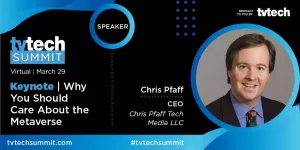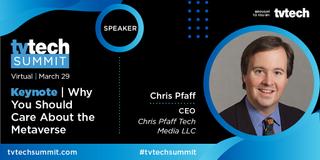The virtual and hybrid event production industry has benefitted from learnings forced upon it by the pandemic. Mostly, this involved the assurance that video delivery had reliability and Quality of Service (QoS). Interactivity, virtual backgrounds and immersive extensions delivered greater capabilities for audiences and producers alike. This was the background for the February 14, 2023 Streaming Media Connect session. ‘How to Do Virtual and Hybrid Events Right,’ moderated by Chris Pfaff and featuring John Porterfield, webcast producer from Social180 Group; Alex Lindsay, head of operations with 090 Media, and Dan Houze, VP, encoding & digital strategy with BCLive.
You can watch the entire session at:https://www.youtube.com/watch?v=P7QkwVemzK0&t=2s

Tyler Nesler, writer for StreamingMedia.com, wrote such an excellent encapsulation of the session, that I am including it here for your reading:
Hybrid events have become much more common since the pandemic, but they have not proven to be as effective or engaging as in-person events. What are some of the issues that prevent the best QoE for hybrid participants, and how can they be remedied? Chris Pfaff, CEO, Chris Pfaff Tech Media, VR AR Association (VRARA), discusses these issues with Alex Lindsay, Head of Operations, 090 Media, and Dan Houze, VP, Encoding & Digital Strategy, BC Live in this clip from Streaming Media Connect 2023.
Chris Pfaff begins by pointing out that it was not too long ago that streamed live events were audio-only, and that it was only just before the pandemic that video began to be widely incorporated into the experience for virtual audiences. The pandemic accelerated the process of developing higher-quality streaming video at scale. However, even with the leap of improvements for QoE, much remains left to be desired. “I think for any event that you’re talking about, whether it’s a corporate event [or] a concert, that’s a huge issue,” he says. “So I really want to start with that as a topic because when we’re all involved in these events, I think we’re very forgiving. But you know, scale is such a huge part of this.” He asks Alex Lindsay of 090 Media, “What’s your take on how far we’ve come in terms of really getting that quality experience and that scale?”
“I think we’re starting to get there,” Lindsay says. “[But] I think we’re sliding backward a little bit. You know, now people want to come back into the room, and I think that the ways we’re coming back into the room have been sliding us back into the 2015, 2016 range.” He laughs and says, “You know, I’ve been doing this a bit longer than ma ny people…”
“We can tell by the gear behind you!” Pfaff says.
“2008, 2009 is when we really started streaming video,” Lindsay says. “And the main thing is that we aren’t doing it that much better now in some cases when we go back to physical events.” He refers to webinars such as Streaming Media Connect, “A lot of these events are starting to work. The problem is that there’s data that we have from 10 years ago that told us that the hybrid events weren’t working, and they’re still not working.”
Pfaff says, “So as an adjunct, that you’re a second-class citizen if you’re not in the room, you should be happy that there’s a camera with a terrible angle of five people on a stage. Is that what we’re talking about?”
“Yeah,” Lindsay says. “When we started, it made sense. You know, we’re streaming Dreamforce, and there’s 15,000 people in the room and 300 people watching, you are second class…”
“For those who don’t know, Dreamforce is Salesforce,” Pfaff says. “It’s Salesforce’s mondo over-the-top annual event.”
Lindsay emphasizes that the core issue is a virtual audience’s sense of not being fully connected to a live event, which ultimately colors their perception of the event’s significance. In that situation, he says, “They don’t feel like the event’s important. They don’t feel like the product is important. They don’t feel like a lot of these things are important, and we don’t talk enough [about that].”
“So you’re saying that in some respect, there’s a brand disconnect?” Pfaff says. That you’re damaging your brand to some extent?”
Lindsay notes that not only does this sense of disconnect damage the brand, but it hampers enthusiasm for virtual participants to return to the event. “It’s the most devastating way to do this because they don’t complain,” he says. “People who complain care about the event, they want it to be better. People who don’t complain oftentimes are just disappearing. We’ve called them and said, ‘Hey, why didn’t you come?’ ‘Well, I was just busy.’ You know, it wasn’t like ‘I’m mad that I felt like I was in the back of the room…’”
Pfaff points out that accessibility is also a critical issue that does not get enough attention. He asks Dan Houze of BC Live about his insights into audience accessibility, not just for digital-first events like webinars but particularly for hybrid events.
Houze narrows the accessibility issue down to consumer versus internal audiences. “I think that a lot of times the virtual shows we’re doing, or the hybrid shows or digital-first shows that we’re doing are sort of just corporate-driven and they’re sort of internal meetings,” he says. “It’s not necessarily launching a keynote for a new product or something like that.”
Lindsay agrees but contends that engagement matters no matter what the type of hybrid event, even corporate ones. “You still have to keep all the employees going in the same direction,” he says. “When you create an event where they don’t feel important, you’re not getting quite the same charge out of your corporate event.”




